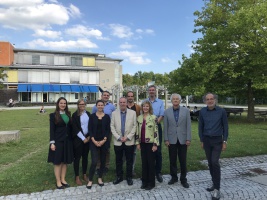
My research story
My current research interests and strengths lie in the area of Sustainable Workforces in Management (SWiM). In business and management studies, while HRM plays a mainstream role in facilitating organisational development, it has arguably less concern for wider social and environmental issues. Here, unfettered HRM contributions to enhancing organisational performance and profits within a weak external regulatory framework appear to have led to unethical and exploitative behaviours by various stakeholders emerging (for example by organisations and managers). Such behaviours often produce unexpected, disruptive consequences arising for employees and union groups, including social dislocation and ecological degradation. As such, my research looks to contribute towards an understanding of managing people more sustainably and the role of HRM on society and the ecology.
I do so at several levels: country, conceptual, and individual, which are detailed in my research foci below.
https://www.nature.com/magazine-assets/d41586-019-03595-0/d41586-019-03595-0.pdf
https://thehill.com/changing-america/sustainability/climate-change/470076-googles-employees-demand-climate-action
My research foci
My research and publications aim to contribute towards an understanding of managing people sustainably and the role of HRM on society and the environment/ecology at several levels: country, conceptual and individual. Specifically, at the:
Country level: I analyse general HRM trends and practices in developing economies such as those in Latin America (Employee Relations), the changing nature of academic work in the UK, European Union and beyond (European Management Review), progressive HRM topics like employee well-being in Brazil (Employee Relations), and HRM issues including improving Expatriation success rates in Eastern countries such as Israel (British Journal of Management).
Conceptual level: I challenge existing orthodoxy and dichotomies of rhetorical and real HRM (Industrial Relations Journal) and develop new conceptual tools in green (environmental) HRM to aid academic understanding and managerial practice (International Journal of Management Reviews). I analyse humanitarian needs in logistics supply chains (Annals of Operations Research), barriers to sustainable public procurement (Resources, Conservation & Recycling), factors shaping relationships between corporate financial and environmental performance (Journal of Environmental Management), and the ‘human side’ of the circular economy (Journal of Cleaner Production). Clearly, the lack of critique, analysis and guidance on the human aspects of managing organisational greening in an ethical manner is an ongoing, emerging concern to many stakeholders (submitting to leading journals).
Individual level: I develop a global understanding of green HRM empirically (The International Journal of HRM), and conceptually (Green HRM: Environmental Sustainability in Action, Routledge 2018), and the greening of global workforces (International Journal of Manpower). Here, my work with researchers in the UK, USA, Korea, Germany, Austria, China, India and Brazil looks to empirically identify the factors which drive forward staff voluntary workplace green behaviours (VWGBs) and any paradoxes arising within them (submitted to the Academy of Management conference).
In addition to membership of relevant, global Business & Management Academies and Professional Associations (CIPD), I am also a member of the International Humanistic Management Association (IHMA) at Fordham University, New York, USA, and the Innovating for Sustainability Salon (ISS) at Ivey Business School, Ontario, Canada.
My most recently published research volume is:
Contemporary Developments in Green Human Resource Management Research: Towards Sustainability in Action?
Edited by Douglas Renwick © 2018 & 2020 – Routledge Publishing.
https://www.routledge.com/Contemporary-Developments-in-Green-Human-Resource-Management-Research/Renwick/p/book/9781138782853
Sustainable Workforces in Management (SWiM)
Dr. Douglas W.S. Renwick
Abstract
This article reviews the relevant literature with the aim of defining and scoping a new concept – of Sustainable Workforces in Management (SWiM) – within the global field of Business and Management Studies (B&M). Herein, I chart descriptions on, definitions of, critiques arising and problematizing around SWiM. I develop SWiM from originally thinking about how and what ways workplaces internationally currently do not seem sustainable, from a workforce perspective. Such limitions appear through current workplaces focusing on: delivering shareholder profits and controlling costs; use of labour as a resource or commodity; introduction of flexibility policies; social exclusion of part-time, zero hours, female, black and minority ethnic (BME) staff; marginalisation of trade union members; and lack of green/sustainability initiatives. I outline some factors needed to make global workplaces more sustainable and deliver SWiM in action, from a workforce perspective, including: greater organisational concern for societal impact; the use of employee voice tools; the introduction of diversity, green and sustainability initiatives; a shift to an "economy of the common good" (ECG); and the use of more social enterprises. This article offers a critical analysis of SWiM, implications for practitioners arising and future research directions forward.
Copyright (c) Dr. D.W.S. Renwick (2017), Sheffield Business School (SBS), United Kingdom.
https://www.scientistsforxr.earth/declaration
Relevant publications
Jabbour, C.J.C. & Renwick, D.W.S. (2020) 'Organizations as catalysts of sustainable development: greening the workforce for responsible management in the 21st century', International Journal of Manpower, pp.1-25.
Paille, P., Valeau, P., & Renwick, D.W.S. (2020) 'Leveraging green human resource practices to achieve enviromental sustainability', Journal of Cleaner Production, vol.260 (July), pp.1-30.
Jabbour, CJ.C. & Renwick, D.W.S. (2019) ‘Greening the workforce: the human side of sustainable organizations’, International Journal of Manpower, special issue call for papers, pp.1-2.
Jabbour, CJ.C., Sarkis, J., Jabbour, A.B.J., Renwick, D.W.S., Singh, S.K., Grebinevych, O., Kruglianskas, I. & Filho, M.G. (2019) ‘Who is in charge here? Unveiling the ‘human side’ of the circular economy’, Journal of Cleaner Production, doi:10.1016/j.jclepro.2019.03.038
Jackson, S.E., Jiang, Y., Shim, H., Budhwar, P., Renwick, D.W.S., Jabbour, C.J.C., Jabbour, A.B.L., Tang, G., Muller-Camen, M., Wagner, M. & Kim, A. (2019) ‘Collectivism and the Social Dynamics of Environmental Behavior at Work’, to the 79th Annual Meeting of the Academy of Management, (Understanding the Inclusive Organization), Boston (MA), USA (August), pp.1-37.
Renwick, D.W.S. (ed) (2018) Contemporary Developments in Green Human Resource Management Research: Towards Sustainability in Action? Routledge Research in Sustainability and Business Series, Abingdon, Oxfordshire: Routledge, pp.1-199. Hardback: 978-1-138-78285-3 e-book: 978-1-315-76895-3.
Latan, H., Jabbour, C.J.C., Jabbour, A.B.L., Renwick D.W.S., Wamba, S.F. and Shahbaz, M. (2018) ‘Too-Much-Of-A-Good-Thing? The Role of Advanced Eco-Learning and Contingency Factors on the Relationship between CEP and CFP’, Journal of Environmental Management (Elsevier), vol.220, August, pp.163-172.
Jabbour, C.J.C. and Renwick, D.W.S. (2018) ‘The soft side of environmentally-sustainable organizations’, RAUSP Management Journal (Elsevier), ISSN: 0080-2107.
Delmonico, D., Jabbour, C.J.C., Pereira, S.C.F., Jabbour, A.B., Renwick, D.W.S. and Thome, A.M.T. (2018) ‘Unveiling barriers to sustainable public procurement in emerging economics: evidence from a leading initiative in Latin America’, Resources, Conservation & Recycling (Elsevier), vol.134, July, pp.70-79.
Jabbour, C.J.C., Dubey, R., Obreiro, S. Jabbour, A.B., Campos, L., Enzo, P. and Renwick, D.W.S. (2017) ‘An Analysis of the Literature on Humanitarian Logistics: Notes for Future Studies’, Annals of Operations Research (Springer), pp.1-19. https://doi.org/10.1007s/10479-017-2536-x ISSN 1572-9338.
Renwick, D.W.S. (2016) ‘Green HRM’, in Wilkinson, A., & Johnstone, S. (eds) Encyclopedia of Human Resource Management, Cheltenham: Edward Elgar, pp. 166-167. ISBN 978-1-78347-545-2.
Renwick, D.W.S., Jabbour, C.J.C., Muller-Camen, M., Redman, T. and Wilkinson, A. (2016) ‘Introduction: Contemporary developments in Green (environmental) HRM scholarship’, The International Journal of Human Resource Management, vol.27, no.2, pp.1-16. ISSN 0958-5192.
Renwick, D.W.S., Jabbour, C.J.C., Muller-Camen, M., Redman, T. and Wilkinson, A. (eds) (2016) ‘Special Issue: Green (environmental) HRM’, The International Journal of Human Resource Management, vol.27, no.2, pp.114-289 (with contributions by Guerci, Subramanian, Markey, Haddock-Millar and O’Donohue). ISSN 0958-5192.98.
Renwick, D.W.S. (2013) ‘Line managers and Green (environmental) HRM’, in Redman, T. & Wilkinson, A. (eds) Contemporary Human Resource Management, (Fourth Edition), London: Pearson Education, p.281. ISSN 978-0-273-75782-5.
Renwick, D.W.S., Redman, T., and Maguire, S. (2013) ‘Green HRM: Teaching and Learning Guide’, International Journal of Management Reviews, https://onlinelibrary.wiley.com/page/journal/14682370/homepage/teaching___learning_guides.htm
Renwick, D.W.S., Redman, T., and Maguire, S. (2013) ‘Green HRM: A review and research agenda’, International Journal of Management Reviews, vol.15, no.1, pp.1-14. ISSN 1460-8545. {Top-10 downloaded IJMR paper & winner: Emerald Citation of Excellence Award}.
Muller-Camen, M., Jackson, S.E., Jabbour, C.J.C, and Renwick, D.W.S. (eds) (2011) Green HRM (Special Issue), Zeitschrift fur Personalforschung (German Journal of HR Research), vol.25, no.2, pp.99-195 (with contributions by Zoogah, Muster & Schrader, Wagner, and Millard). ISSN 0179-6437/1862-0000.
Jackson, S.E., Renwick, D.W.S., Jabbour, C.J.C., and Muller-Camen, M. (2011) ‘State-of-the-Art and Future Directions for Green Human Resource Management’, Zeitschrift fur Personalforschung (German Journal of HR Research), vol.25, no.2, pp.99-116. ISSN 0179-6437/1862-0000.
Renwick, D.W.S., Redman, T, and Maguire, S. (2008) `Green HRM: A review, process model, and research agenda´, White Paper, (Management School, University of Sheffield), pp.1-48.
Adobe Acrobat document [330.4 KB]
Case studies from Brasil - in Brasilian Portuguese
Employees of the Brasilian Environment Ministry protest against the lack of sustainability leadership
In August 2019, due to record fires in the Brazilian Amazon, more than 400 public servants of the Brazilian Institute of the Environment and Renewable Natural Resources (IBAMA) organized and wrote an open letter to Brazilian society urging public authorities and the population to carefully analyze the challenges faced by environmental management in Brazil (G1 Globo Newspaper, 2019). More here below:
Top female leaders of Brasilian organizations share best practices in sustainability management
Top level organizational leaders have organized themselves in a Facebook community named ‘Brazilian Network of Women Leaders for Sustainability’. This online social media voluntary is organized to share best practices and examples on organizational green behaviour championed by female leaders working in Brasilian companies. More here below:
(https://www.facebook.com/pg/
Voluntary green behavior in the construction industry: taking pictures of best practices for waste management
In 2015, a Brasilian new build construction firm received a sustainability award for thier employee green behaviours. There, master builders started acting as sustainability champions, a role that goes far beyond supervising the progress of work at their construction sites. They started an initiative called ‘Sustainability Eyes at Construction Sites’, where they shared tips on photography to photograph the challenges and best practices of sustainable waste management at thier construction sites. Theit initiative produced high quality, inspirational photographs which were exhibited at the Brazilian museum Pinacoteca of the State of São Paulo (Exame Sustainability Awards, 2015). More here below:
https://exame.abril.com.br/
Waste used to produce stationary materials for employees
At Flex company, employee green initiatives were rewarded regarding the reuse of hundreds of kilos of vinyl banners – frequently used materials that take more than 500 years to decompose nature - to produce stationery cases and plastic pencil boxes to be used in training programmes. The pencil boxes were produced through a partnership between Flex and a non-governmental organization which focuses on female entrepreneurship for the circular economy in South America (Revista Meio Ambiente Industrial, 2019). More here below:


















